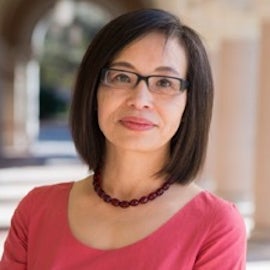I do not formally belong to the anthropology department and therefore, I don’t accept anthropology graduate students.
Born in Japan to Korean parents, Sonia Ryang grew up speaking both Korean and Japanese. Ryang received a Ph.D. degree in Social Anthropology from Cambridge University, England, and worked as a Research Fellow at the Research School for Pacific and Asian Studies, the Australian National University, before being appointed as Assistant Professor of Anthropology at Johns Hopkins University. Ryang moved to the University of Iowa as an endowed chair of Korean Studies and professor of Anthropology. At Iowa, she directed the Center for Asian and Pacific Studies and also served as the Director of Academic Programs in the University of Iowa International Programs. She came to Rice in 2014 as the Director of the Chao Center for Asian Studies; after six years of directorship, she joined the Department of Transnational Asian Studies, her home department.
She has been elected the President of the Society for East Asian Anthropology (2020-2022).
Sonia Ryang is a social anthropologist by training, having obtained her PhD from Cambridge University in 1995. She began her anthropological career with research on the Korean minority in Japan as her primary focus of investigation. While, in many senses, this field of research continues to constitute the core of her work, she now also concerns herself with a much broader set of conceptual and ontological questions pertaining to human existence, encompassing ethnic minorities, diaspora, totalitarianism, ideology, romantic (and other forms of) love, language, food, and, more recently, science. While her books explore a wide range of themes, they are all underpinned by a desire to explore and elucidate the socio-historical functions and materiality of ideas that humans have created and subjected themselves to through the self-imposition of various rules, codes, and institutions. While this human journey has been marked by countless demonstrations of imagination and ingenuity, it has also witnessed innumerable examples of tragic error and loss. Sonia's scholarship tries to address these. Thus, it is unequivocally interdisciplinary and cross-disciplinary in nature and orientation, combining area studies, literature, history, gender studies, diaspora and transnational studies, philosophy, and ethics, among others. Geographically, she has focused on Korea (North and South) and Japan (the Korean diaspora in Japan) throughout her career. More recently, envisioning the concept of transnational Asia, she has begun to explore the best means by which the boundaries between Asia and Asian America can be undone, for, when viewed from multiple angles, such a distinction is rapidly becoming an artificial one.
With the grant funding by the National Science Foundation (Proposal ID: BCS-1357207) Sonia Ryang has recently finished a project which investigated how language functions to create truth in North Korea. This study resulted in the publication of her recent book, Language and Truth in North Korea (University of Hawaii Press, 2021).
BOOKS
Language and Truth in North Korea
Sonia Ryang
Eating Korean in America: Korean Food and Globalization
Sonia Ryang
Reading North Korea: An Ethnological Inquiry
Sonia Ryang
Writing Selves in Diaspora: Ethnography of Autobiographics of Korean Women in Japan and the US
Sonia Ryang
Love in Modern Japan
Sonia Ryang
Japan and National Anthropology: A Critique
Sonia Ryang
North Koreans in Japan: Language, Ideology, and Identity
Sonia Ryang
EDITED VOLUMES
Diaspora Without Homeland: Being Korean in Japan.
Sonia Ryang and John Lie (editors)
North Korea: Toward a Better Understanding
Sonia Ryang (editor)
Koreans in Japan: Critical Voices from the Margin
Sonia Ryang (editor)

